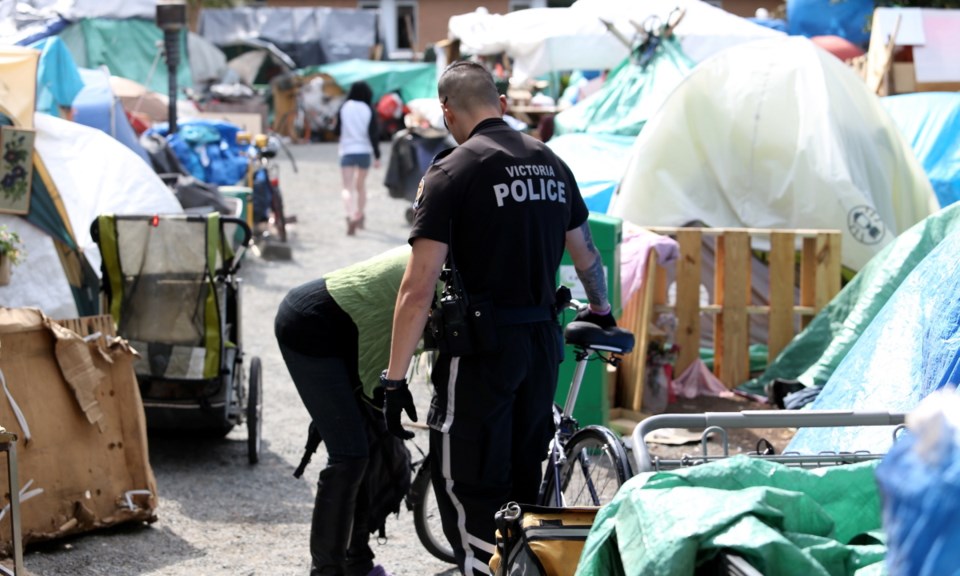Extra police patrols in the neighbourhoods surrounding Victoria’s tent city are proving their worth, says VicPD’s acting chief.
Officers dealt with at least 25 incidents — ranging from assaults to recovery of stolen property — in the first 11 days since Victoria council approved extra funding May 20, Acting Chief Del Manak told councillors on Thursday.
In one instance, officers near tent city helped to arrest a man reported to have been involved in an assault with a knife in front of Our Place on Pandora Avenue, Manak said.
“A description came across of this male. Units are responding to Our Place to locate this male, and the male came running into tent city,” Manak said. “He’s a tent city resident, and because our officers are deployed in the neighbourhood, he comes right into the arms of our officers.”
Two weeks ago, Victoria councillors approved spending up to $113,000 to implement a public-safety plan devised by Manak. Under the plan, two officers are deployed in a three-to-five block radius surrounding tent city six hours a day, seven days a week. After June 11, the plan is to scale the patrols down to five days a week.
Having officers in the area means that people are becoming comfortable approaching them on the street to report incidents that they might not otherwise call police about, Manak said.
“That’s what police are there for,” he said.
“If you’re the victim of a crime or you think something untoward is going on, you have to phone us and allow us to make the decision of when we’re responding and how we respond.”
Manak said crime statistics don’t capture a lot of what the police do.
“Much of our time is spent on maintaining social order,” he said.
“It’s about public urination, needles, garbage, noise, disturbance, unwanted people, suspicious circumstance or somebody’s having a negative drug reaction.
“All of these incidents have nothing to do with the Criminal Code and it doesn’t necessitate a criminal response, but it’s a response where people don’t feel safe and they want to make sure the person who’s in distress gets help.”
Manak said officers have been interacting with people who live and work in the area.
They discovered problems at the YMCA, which is adjacent to the tent city: People entering the public washroom, loitering, and in some cases locking themselves in and using drugs.
“They were getting complaints from their customers. Because our officers are in the neighbourhood, they walk in, they engage with them and they were able to work out a plan with them about how best to resolve the challenges they were having,” he said.
Manak has also asked the province to provide funding for two officers to be deployed within the camp itself. He said that funding is still in the approval process.
Stephen Hammond, of the citizens group Mad As Hell Victoria, said neighbours are pleased to have the extra police presence, but it’s difficult to say how much of an impact it is having.
“If the chief and others are reporting that things are improving or they are catching more people, that’s what we’ve been wanting all along,” Hammond said.
“Knowing that it’s a very weird, strange situation, in which they’ve got that tent city and can’t really do anything internally, we’ve been saying all along: Then take care of the neighbours who are around there, because it’s unfair what they are going through.”



